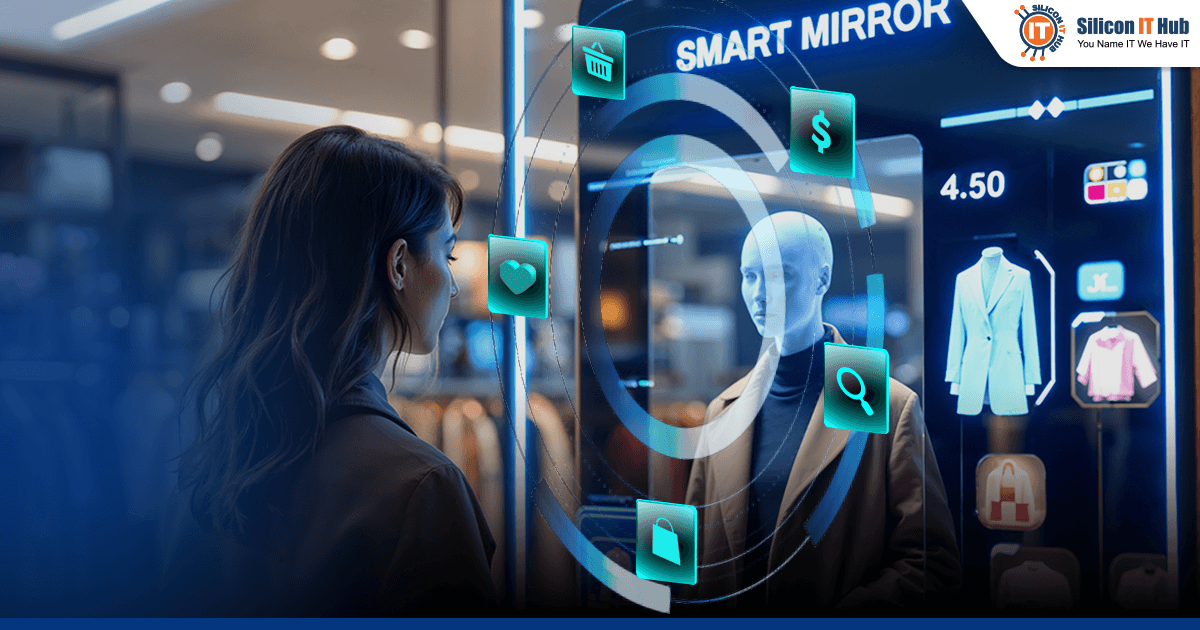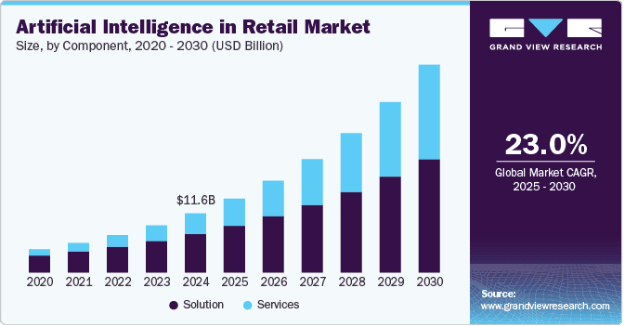Growth with Intelligence- Scope of AI in Retail & Lifestyle Industry

Introduction
As a retailer, you always want to give your customers a rich and pleasant shopping experience. Whether it is offering personalized recommendations or real-time support, the retail and lifestyle industry needs innovative solutions to attract and engage more customers. AI development services can build such solutions using the revolutionary artificial intelligence technology.
Let’s dig deep into the role of AI in the retail and lifestyle sector with its trends and implementation considerations.
Rise of AI in Retail and Lifestyle Sector
Artificial Intelligence (AI) is a complex concept that touches almost every industry, and the retail sector is no exception! This technology is gaining ground swiftly in the sector thanks to its vast scope and adaptability. As per the McKinsey Digital report, generative AI alone is expected to create economic value between USD 240 B and USD 390 B for retailers.
As per the Grand View Research report, the market size of AI in the global retail sector is expected to grow at 23 percent CAGR between 2025 and 2030. The following blog shows how the usage of AI is increasing gradually over the period.

In this digital age, tech-savvy customers look for deals and research products online. AI is capable of integrating with online and offline shopping. An AI app development company can leverage its capabilities to offer automated checkout and personalized experiences. AI is beneficial for demand forecasting, supply chain management, and fraud detection.
Moreover, AI software development services can build virtual agents and ensure security while meeting the prevalent regulations. Let’s understand the major business benefits of AI-powered apps in the retail and lifestyle sector.
Key Benefits of AI Applications in Retail and Lifestyle
AI can give actionable insights and automate core processes effectively. AI development services can make tailored applications using this technology to increase agility, flexibility, and transparency in retail processes. Here are the top benefits of AI apps in the retail and lifestyle sector-
Enhanced Visibility
AI-based software relies on a centralized, common data model built for retailers. It can create a single version of the truth for all business cases, and retailers can get high visibility with more flexibility.
More Customer-Centric Approach
The retail and lifestyle sector needs to keep customers in the center. AI application can give a holistic view with both internal and external data based on customer behavior. This can give a more personalized approach.
Supporting Innovation
One of the biggest benefits of AI is it supports innovative business models based on analysis of customer data. Retailers can generate new revenue streams by implementing insight-driven strategies.
Personalized Experiences
Dynamic and data-driven decisions can help retailers offer personalized experiences and instant support to their customers. It can improve relationships between brands and customers.
Automated Processes
Automation of routine tasks, including inventory management and order fulfillment, can increase the efficiency of retailers. This automation also enables them to focus on more strategic activities.
Advanced Demand Forecasting
More accurate and instant information about future demand is beneficial for retail organizations. They can adapt more quickly to changing market conditions and reduce wastage significantly.
Price Optimization
AI-based tools are useful for determining effective pricing strategies. AI technology is useful for maximizing revenue and gaining a competitive edge in a challenging business scenario.
Improved Decision-Making
Retailers can get access to data and actionable insights in real time with the help of AI technology. It enables them to make more informed decisions about the pricing and marketing of products.
Simply put, AI apps give retailers a competitive edge while transforming core processes of the lifestyle and retail sector using advancements of emerging technologies.
AI-Powered Applications Transforming Lifestyle and Retail
AI application development services make advanced and feature-rich apps for the retail and lifestyle sector. Here are the ways, these AI-powered apps can bring transformational changes-
Virtual Stylists
AI-powered virtual stylists can suggest styles for outfits or lifestyle products by analyzing the customer’s preferences, past purchases, and real-time behavior. These virtual stylists can learn over time to become more accurate and give personalized experiences. They are beneficial in enhancing user experiences and increasing conversion rates.
Smart Mirrors
“Mirror, mirror on the wall, who’s the fairest of them all?” – We know this saying, right? Smart or interactive mirrors can take it to the next level by enabling customers to try clothes or makeup virtually and showing their appearance. These mirrors can show different styles, colors, and combinations even without changing clothes to increase engagement.
Recommendation Engines
AI development services make recommendation engines that can analyze massive amounts of data, including purchase history, demographics, and clicks to give personalized suggestions. These robust, AI-driven engines can ‘learn’ from user interactions and enable retailers to improve customer satisfaction more efficiently.
Retail Analytics
Analytics platforms can monitor and analyze customer behavior, inventory movement, and sales patterns continuously. Retailers can make decisions and identify trends based on insights. They can also get more idea on demand and increase efficiency. Google Cloud for Retail offers deep insights into shopper behavior and staff allocation.
AR/VR Experiences
AR/VR technology can offer immersive experiences to customers as they can visualize products in visually rich environments. Nike and L'Oréal are some of the top brands that have used AR/VR technologies successfully. These experiences can increase user engagement and enhance their confidence in online purchases.
Moreover, retailers can implement an omnichannel strategy to offer a seamless shopping experience to their customers across all touchpoints. This strategy is useful for offering a unified view across various channels, including online, mobile, social, and in-store. This results in increased loyalty of customers and efficient operations.
Emerging AI Trends in Retail Industry to Watch
AI has shown great potential in recent years. Every industry sector has started using this technology in multiple ways. Talking about the retail and lifestyle sector, we can mention the following emerging trends-
Generative AI
From AI-powered chatbots to virtual assistants, generative AI tools have already revolutionized the way retailers interact with customers. This concept will evolve to save time and efforts of retailers in running the campaign while ensuring brand consistency.
Conversational AI
Voice assistants can transform shopping experiences and customer service. Shoppers can browse, inquire, and place orders using their voice or text. This concept has made the purchasing process more convenient and intuitive, especially in hands-free environments.
Sustainable Solution
AI can play a vital role in strengthening sustainability by optimizing supply chains and enabling eco-conscious product recommendations. AI assists retailers in reducing waste, energy consumption, and carbon footprints. We can expect that this trend will gain prominence over the period.
Predictive Insights
Predictive analytics is a powerful and popular trend of AI technology. It helps retailers predict customer behaviors more accurately. It empowers brands to design loyalty programs and retention strategies to maximize revenue and increase customer satisfaction.
Hyperpersonalization
Tech-savvy shoppers expect more personalized promotional campaigns. AI can make it possible by enabling hyperpersonalization with the help of real-time data. Retailers can deliver highly relevant product suggestions and offers to their customers using this concept to boost loyalty.
Retail and lifestyle business owners can leverage the advantage of these trends through advanced AI development services.
Key Challenges and Considerations of AI Implementation
Though AI can be a game-changing technology, it is essential to meet implementation challenges to leverage its benefits. One of the biggest challenges of AI implementation in retail is ensuring ethical usage. Retailers must save and manage vast volumes of customer data responsibly. They need to consider regulations like GDPR and CCPA.
Another major challenge is the integration of AI with legacy systems. Many retailers struggle with legacy infrastructure and outdated tools that are not compatible with cutting-edge AI tools. A reputed AI software development company can help you consider these aspects and address implementation challenges effectively.
Role of Silicon IT Hub as AI Software Development Company
As a leading AI development company, Silicon IT Hub can build robust and feature-rich software for the retail and lifestyle industry. Our expert developers have hands-on experience in using cutting-edge technologies, including NLP, generative AI, and chatbots. We assist retailers in expanding their business online with the help of a tailored, feature-rich AI application.
At Silicon IT Hub, we ensure that retailers can leverage the benefits of a revolutionary AI technology in multiple ways. Some of these ways include
Custom AI Software Development
Integrating AI Applications with Existing Ecosystems
Improving Customer Experience
Implementing Advanced Technologies
Ensuring Compliance and Ethical Use of AI
Offering Ongoing Support and Maintenance
Contact us to learn more about our comprehensive AI software development services.
Looking for Developing an AI-Driven App for Your Retail Business?
LET’S CONNECT!Concluding Remarks
From personalized experiences to enhanced support and advanced search to loyalty programs, AI technology lends a helping hand to retailers at every stage. AI-based applications like smart mirrors and recommendation engines can take the retail and lifestyle business to the next level.
However, it is imperative to address implementation challenges to leverage the benefits of AI through its trends.





 Have an Idea?Let’s Build It Together!
Have an Idea?Let’s Build It Together!